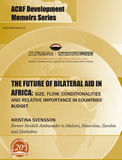
The publication addresses the growing frustration with lack of aid effectiveness that has set in motion a slow but visible transformation of the way in which development cooperation is being pursued, as embodied in the Millennium Declaration, the Paris Declaration of 2005 on Aid Effectiveness, and the International Health Partnership. Donors' programs are increasingly result- based, with greater emphasis on national to achieve its goal of assisting newly ownership and leadership, real donor harmonization and alignment with the development strategies of partner governments. There is also increased focus within the donor community on the interactions between economic and democratic development. As a result, development actors have become more enlightened about the importance of accountable, representative and transparent government institutions. At the same time, organizations that promote democracy have learned that a government's failure to deliver visible results can undermine democratic reforms





